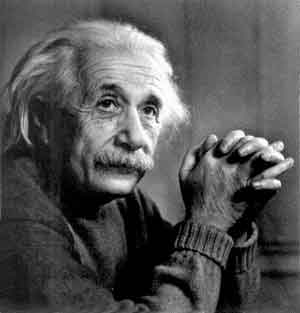Einstein's God

| Listen Now! | Transcript | Helpful Guide |
“I cannot conceive of a personal God who would directly influence the actions of individuals, or would directly sit in judgment on creatures of his own creation. I cannot do this in spite of the fact that mechanistic causality has, to a certain extent, been placed in doubt by modern science. My religiosity consists in a humble admiration of the infinitely superior spirit that reveals itself in the little that we, with our weak and transitory understanding, can comprehend of reality. Morality is of the highest importance — but for us, not for God.”
-Letter from Einstein (August 5, 1927)
Einstein clearly stated that he did not believe in a personal God, who has personal relationships with people and is the almighty judge. Instead, he believed in nature as universal spirit or mind that ruled the universe and was beyond our comprehension. This he referred to as God.
Einstein wonder in God started as a small child when his father showed him a compass. He was amazed by it and how it didn’t act the way he expected. From here he began to seek order in everything and wondered, “what God was thinking”. Einstein was trying to figure out if God had to make the world this way.

Although Einstein was technically a Jew, he was not a practicing Jew or a believing one. Instead science was his religion. He considered these two separate realms but shared a common characteristic. They both tried to explain those mysteries of life. He believed that “God’s” intelligence was orderly and that is the beauty of His nature. Einstein was looking for that mathematical equation to define the world. Nature is mathematical. He is quoted, “God does not play dice with the universe.” He found this in his theory of relativity of E=mc2.
These ideas of mathematics to nature lead Einstein’s ideas on time. Time is elastic and warping. It is the heart of nature. With time comes the idea of eternity (existence before time). Here, Einstein believed in St. Augustine’s view that God was beyond time. Time came into existence with the universe.
Einstein believed that emotions gave form to religion and later influences our moral impulses. Einstein said he felt a cosmic religious sense, a sense that he saw in the prophets, St. Francis of Assisi, and Buddha. Here an individual feel the vanity of human desire and the nobility and wonder of nature and the world of human thought. Life is felt as a prison, a person wishes to feel the world as a whole. This wish is the most important part of art or music. Theology was the midwife to science.
Einstein desired to know why God created the world. He believed in rational world order and found wonder in the beauty of mathematical elements of nature. The laws of physics made this world fit for life and can allow one comprehend the universe or, “glimpse the mind of God.” God does not intervene with physics because he created them, but the uncertainty of quantum physics leaves room for God to play a role.

Einstein believed that people were able to block time. Once dead, a person still lives on in the memory of those who knew him. This way a person has reached eternity.
People were not the pinnacle of creation, just a part of nature. We can feel a cosmic sense from nature because we are part of it. We can feel the presence of Einstein’s God.
